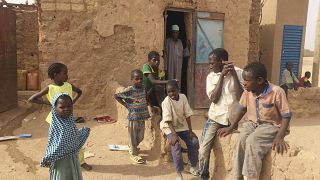Nigeria
Ten years ago the threat of jihadist violence forced Falmata Mustapha to abandon the fertile land that her family had cultivated for generations outside the village of Gonglugong, in northeastern Nigeria's Borno state.
Her only option was to work a plot of land that was far less fertile but at least was relatively safe, for it lay within the village's secure perimeter.
Nigeria's jihadist insurgency has shifted and evolved since it began in 2009, with Boko Haram militants losing ground to military offensives and forced to battle rivals linked to the Islamic State group.
But for farmers like Mustapha, the grinding war remains a constant menace that keeps her from her land, like many of the more than two million people displaced due to the conflict.
"This plot does not give much, but where we are here, at least Boko Haram will not come and kill you," said the 60-year-old farmer.
Past the military checkpoints that surround and protect Gongulong, the fields have become tantalizingly lush from the rainy season but remain off-limits.
Much of the northeast's food-producing land remains at the mercy of jihadist insurgents.
The battle to create an Islamic caliphate in the region has left more than 40,000 dead and created one of the worst humanitarian crises of the 21st century.
"Again this morning, Boko Haram attacked several farmers. Thank God they didn't kill them and just took their money," Mustapha said, raising her hands to the sky.
- Impossible dilemma -
Two years have passed, but the grandmother has not forgotten the day in December 2020 when jihadists slaughtered 43 farmers on a rice field in the neighbouring village of Koshebe.
Since that massacre, only a few people go beyond the army's barricades and protective trenches to work the land "with fear in (their) stomach," she said.
Doing so also means taking the risk of being accused by the army of collaborating with jihadist fighters and of being arrested.
"It's a dilemma for the farmers, who have to choose between struggling to feed their children or putting themselves in danger to bring back food by going to the other side of the trenches," said the head of the UN Office for the Coordination of Humanitarian Affairs (OCHA) in Nigeria, Trond Jensen.
Mustapha can't remember the last time she had enough money to eat meat, or when her children could still eat three full meals a day.
But, she said, she's "lucky" because at least she has access to some land.
That is not the case for millions of people in the region who have abandoned farming altogether, taking refuge in so-called garrison towns that are meant to provide more security.
Around 1.74 million children under the age of five face severe malnutrition in northeast Nigeria, according to the UN.
Medical centers that care for the most critical patients are overflowing with children in need of urgent assistance, their hunger visible by their protruding ribs and swollen bellies.
"It's all because of the war," said Amina Abdulahi, 42, who hugs her granddaughter on a metal bed at a medical center for severely malnourished children in Damaturu, capital of Yobe State.
- Child hunger -
Rahama has the build of an infant just a few days old. But her deep gaze and her wide-open black eyes do not deceive: the little one was born six months ago already.
She looked even more frail next to the huge elephant painted on the wall of the center supported by the humanitarian organisation Plan International.
Doctors have been trying to get the child to gain weight for three days, along with about 40 other children whose bodies are deformed by hunger.
"In our village, we have lost dozens of children in recent years," said grandmother Abdulahi, her face surrounded by a plum-colored veil.
Some evenings, she said she puts her eight grandchildren to bed with their stomachs empty and waits for them to fall asleep, exhausted from their incessant cries.
"Each year is worse than the previous one because of the dragging conflict," said Dr. Hauwal Larai Goni, Yobe state public health officer.
The 13-year-old insurgency is primarily responsible for the region's food crisis.
But recent floods which destroyed thousands of farms in the region, double-digit inflation caused by the coronavirus pandemic, and then the Russian offensive in Ukraine are additional factors, worsening an "already catastrophic" situation, she said.
According to the UN, some 370,000 children under the age of five face a high risk of mortality, and 5,000 children are at risk of dying without immediate funding to respond to the crisis.











01:00
Pix of the Day: July 16, 2025
00:52
Nigeria's former president Buhari laid to rest in his hometown of Daura
01:00
Pix of the Day: July 15, 2025
02:30
Morocco’s oases struggle to survive amid growing desertification
02:03
Muhammadu Buhari's legacy: higlight of his presidential tenure
01:11
World leaders express condolences over death of Nigerian ex-president Muhammadu Buhari